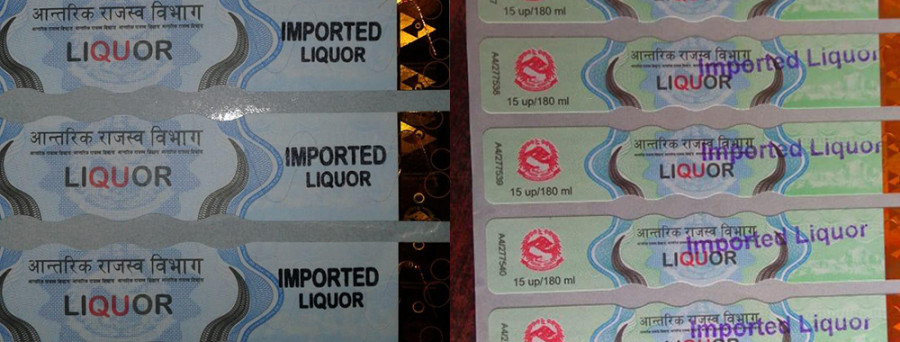National
Government is running out of duty stickers and that may halt liquor and cigarette sales
All liquor and cigarette products require an excise duty sticker, but with the procurement process halted, stickers are fast running out.
Prithvi Man Shrestha
There’s plenty of liquor but Nepalis may soon have none to buy.
With the government almost out of its stock of excise duty stickers, there could be a halt on the import of foreign alcohol. Liquor and tobacco manufacturers must paste excise duty stickers on their products in order to sell them in the market, as per Excise Duty Regulations.
According to the Inland Revenue Department, the agency that implements the regulation, excise duty stickers are already in short supply. Stickers for imported liquor have already run out and the department has resorted to using stickers that are meant for local products.
Baburam Gautam, regional sales manager at Global Trading Concern, a dealer of liquor brands like Johnnie Walker and Smirnoff, said that they were placing stamps that say “imported” on stickers meant for domestic products. Importers like Gautam are worried that using such stickers could lead to a flood of smuggled alcohol in the market.
“As the stamp has to be put manually, there is a risk of unscrupulous people making duplicate stamps,” said a liquor importer who did not wish to be named. “The government must ensure that we get the stickers we have paid for.”
According to Ramesh Shrestha, president of the Nepal Beverage and Cigarette Industries Association, companies are already finding it difficult to obtain any stickers, not just for imported liquor.
“We are concerned over whether we might have to shut down the industry due to a lack of excise stickers,” Shrestha told the Post.
Tax officials said if they fail to procure new stickers in the next few months, they may either have to allow liquor producers and sellers to sell their products without exercise stickers or halt all sales.
“Other types of stickers will soon be unavailable in the next two-three months,” said Thaneshwor Gautam, deputy director-general of the department.
The department sells over 40 different stickers for various categories of liquors and cigarettes.
“It takes around five months to sign contract agreements after a tender is announced, and additional time is needed for supply,” said Gautam. “It is not clear when the department will be able to begin the procurement process.”
The department does not have any immediate alternative, as the Supreme Court, on November 15, had issued an interim order putting a halt to the procurement process for new stickers through an international competitive bid. The department had planned to procure around 8 billion stickers for use over the next two years.
The court had issued its order in response to a writ claiming that the tender call barred domestic printing companies from participating in the bid.
In early November, just days before the Supreme Court order, the parliamentary Public Accounts Committee had also ordered the government to immediately suspend the bid for the supply of excise duty stickers immediately, arguing that the tender process barred domestic players from participating.
Gautam, however, said the tender notice didn’t bar domestic players.
“It only opened the door for foreign players given that there is no security printer registered in Nepal,” he said.
There was also pressure from the Ministry of Communication and Information Technology on the Finance Ministry to stop the tender for stickers on the grounds that it was in negotiations to set up a dedicated security printing press in the country. On the same grounds, the Department of Passports had also cancelled the global tender for e-passports, whose stock is also depleting fast.
Officials, however, said that there’s no certainty over when, or if, the government will procure its own security printing press to print passports and excise stickers.
In the past, excise stickers used to be printed by the government’s Department of Printing.
“But in light of several problems due to weak security features, we started procuring excise duty stickers from abroad,” said Gautam of the Inland Revenue Department.
The shrinking stock of stickers could also result in a halt to cigarette sales, which require a sticker too.
Tax officials said that any halt to liquor and cigarette sales could impact revenue collection, which is already far below target, as the two products are major contributors to the treasury.
The average revenue growth rate, as of the first five months of the current fiscal year, stood at 3.71 percent against a target of around 30 percent, according to the Finance Ministry. When it comes to excise duty, the growth rate is just 0.53 percent.




 9.83°C Kathmandu
9.83°C Kathmandu














